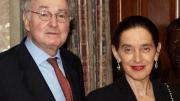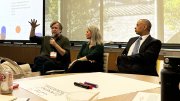Six days before the public launch of The Harvard Campaign, in which the University will “foreground” pedagogy and learning, according to President Drew Faust, two news announcements underscored the scope of that initiative:
- Provost Alan M. Garber announced the creation of a new senior post, vice provost for advances in learning, as a way to focus faculty and institutional engagement with efforts to enhance education across Harvard. Carswell professor of East Asian languages and civilizations Peter K. Bol will assume the role immediately.
- Harvard School of Public Health (HSPH) announced receipt of $12.5 million to support revising the pedagogy for its master’s degree programs and creating a new doctorate in public health leadership. That support, plus newly disclosed prior gifts and grants totaling $5.8 million, will enable the school, according to a news release, to deploy “more case-based and field-based ‘real world’ learning opportunities.” HSPH will also “accelerate efforts…to develop ‘flipped classroom’ experiences, in which lecture-style material is delivered increasingly online before class, while classroom time is spent by students and faculty actively engaging together to develop strategies for solving the types of problems students will encounter in their careers.” (For one faculty member’s first-person account of creating and teaching a “flipped” course, read “Reinventing the Classroom,” from the Harvard Magazine archives.)
Together, the announcements suggest accelerating efforts to apply technology to teaching and to rethink pedagogy on a school-wide scale across Harvard.
Context
In recent years, several efforts to apply cognitive science and discoveries about learning to the classroom (to improve teaching practice) and to explore educational technologies have gathered strength across Harvard:
- Science faculty members have redesigned introductory classes, made hands-on laboratory experiences widely accessible, and used interactive devices to assess learning in real time—all out of concern about losing students who might otherwise fail to pursue their passion for science, technology, engineering, or mathematics (part of a larger national discussion about this phenomenon).
- The Harvard Initiative for Learning and Teaching (HILT), catalyzed by a $40-million gift during the University’s 375th-anniversary celebration, has created a forum for discussing the issues across campus, and backed experimentation and innovation with seed grants—including, it turns out, to HSPH (see below).
- The edX online-education partnership with MIT, launched in the spring of 2012, has jump-started experimentation with the use of technology in virtual and campus teaching contexts. HarvardX now has its own production staff and studio to accelerate online course development, and HILT and HarvardX are collaborating to train faculty members and graduate students to incorporate the new technologies in their courses and teaching.
- Individual schools are also investing in their own teaching-support infrastructure, as in the appointment of the first faculty director for the Faculty of Arts and Sciences’ Bok Center for Teaching and Learning: Robert A. Lue, who is also faculty director of HarvardX.
The Vice Provost for Advances in Learning
It is within this context that Provost Garber announced the appointment of Peter Bol as the new vice provost. In a conversation, Garber noted that there had been “an explosion of interest in how we approach teaching and learning at Harvard”—dating especially from the gift that launched HILT in 2011. That does not mean that every faculty member is suddenly eager to offer online courses, he emphasized; but “more and more faculty are interested in being involved in some way” in rethinking their teaching. That has created the need for a dedicated position responsible for stimulating further work on improving pedagogy across the University, serving as a source of information and guidance for interested professors—and making clear that “faculty should be leading these efforts.” The new vice provost, Garber said, should be someone “who is actively involved in teaching and in innovation” (as Bol is and will continue to be), in order to maintain contact with students and direct experience in the evolving Harvard classroom.
According to the announcement, Bol will report to the provost, while overseeing both HarvardX and HILT. In that capacity, he will work with those units and faculty members and deans to “support Harvard’s broader efforts to improve education by leading campus discussions about innovations in teaching and learning and their implications; working with the schools to develop policies and best practices; and fostering collaboration with the Harvard Library, the museums, the Division of Continuing Education, and Harvard University Information Technology, as well as related teaching and learning centers such as the Bok Center.”
Bol has long pioneered new approaches to technologically enhanced research and teaching:
- More than a decade ago, he and graduate students reported from Zhejiang Province, south of Shanghai, where they were digitally documenting local village and community life; electronic databases, videos of lineage halls, and other tools were incorporated into a course on “The Culture of Everyday Life in China” that he taught with professor of Chinese history Michael Szonyi.
- He has applied database technology to the vast archives of Chinese leaders through the millennia, creating new opportunities for digital scholarship while engaging colleagues in the United States, China, and Taiwan. Those efforts have been married productively to his academic leadership of Harvard’s efforts to use geographic information systems and geospatial technology in a host of scholarly disciplines—including developing a new course that was supported by a HILT innovation grant.
- He was, as Garber’s note observes, chair of the Harvard academic computing committee, and now is a member of the HarvardX faculty committee.
Now, with colleague William C. Kirby, Chang professor of China studies and Spangler Family professor of business administration, he has adapted Societies of the World 12, “China,” for online teaching through edX as SW12x, debuting next month; it is simultaneously being taught in the College and through the Extension School. (As previously reported, last spring Bol taught Chinese History 185, “Creating ChinaX—Teaching China’s History Online,” in which students and teaching fellows jointly learned the content while preparing materials for use in the SWx course. The image below, courtesy of HarvardX, shows Bol during the production of the online course.)

The application of edX technology to campus classrooms is particularly important. HarvardX aims at both disseminating course content worldwide—the best known use is for “massive open online courses” (MOOCs)—and, somehow, deploying the videos, online exercises, student discussion forums, and other relatively expensive tools in existing courses at the University. Faculty members who have been skeptical about the feasibility of campus applications are watching to see how such uses unfold in their colleagues’ teaching. In his address at the University of St Andrews this past weekend, Harvard president emeritus Derek Bok focused on the role of such technologies in enhancing live, classroom teaching—consistent with his long-term emphasis on pedagogy and learning. In an interview with Stanford Magazine, that institution’s president, John Hennessy, a champion of applying technology to education, focused squarely on campus classrooms, deflecting attention from MOOCs’ role in disseminating courses around the world. Speaking about plans to expand the undergraduate body, he was asked about the use of MOOCs (Coursera and Udacity, two MOOC enterprises, were created by Stanford faculty members). He responded:
There's a bigger question about online education, of which MOOCs are a small piece. MOOCs will be important for self-motivated learners and people who can't get access to a high quality education. We don't view them as a substitute in any way for what we can offer undergraduates. But, MOOCs are something that Stanford can offer to improve the quality of education available worldwide.
A separate question is whether technology has a role to play in improving the quality of the educational experience right here on campus or at our overseas campuses. A lot of our current focus is on how we make some of our classes, particularly large lecture classes, much better learning environments. How do we use technology to improve our pedagogy? We are very committed to that goal. And we would do that independent of whether we kept class size the same or expanded it.
Garber stressed that edX and HarvardX have a three-part mission: to make Harvard professors’ teaching available worldwide; to improve teaching on campus; and to support research on teaching, learning, and the effectiveness of education technologies in the classroom. Most discussion of MOOCs and edX during the past year has focused on the first of these goals, he said; “Peter Bol is committed to all three.” The most effective learning, the provost said, continues to involve extensive face-to-face interaction among faculty members and students, augmented by making the best use of new technologies.
By selecting Bol for the new learning post, the provost has chosen a senior faculty member who has deep experience, across disciplines, in applying new tools to his own teaching, while establishing relationships with a large number of the leaders in pedagogical innovation across Harvard. (Disclosure: Bol is a past member of the board of directors of Harvard Magazine Inc., a current member of its board of incorporators, and a nominee for a new term of service as a director of the organization.)
“Transforming Public Health Education”
HSPH, according to the announcement, plans a broad effort to “redesign its educational strategy.” This past May, at the HILT conference, Dean Julio Frenk outlined his school’s centennial-year curricular plans. He talked about redesigning instruction to focus on competency-based learning, with flexible, modular, experiential units accommodating students at various points in their professional lives. He also endorsed the “blended” online and class-based teaching techniques of the flipped classroom. The mix of online and face-to-face instruction, he said, would vary with the purposes, with more online teaching for “informative,” expertise-oriented learning, and progressively more personal instruction for “formative” (values and professional) and “transformative” (leadership) courses. He then reviewed the institutional challenges: colleagues (investing in faculty development); capacity (physical space, technology, finances, and so on); and culture (changing from language that describes a professor’s teaching “load” to give teaching a value equal to research; the rewards for teaching and research; and the school’s self-identification as a preeminent research institution). View the video recording of Frenk’s HILT presentation here.
According to Ian Lapp, associate dean for strategic educational initiatives, Frenk began planning to revisit HSPH’s curriculum and pedagogy some three years ago, reflecting his awareness of both changing needs for public health and evolving learning methods and technologies. On November 1, the school is devoting a centennial symposium to the subject and its aspirations.
But it is one thing to envision an initiative for “Transforming Public Health Education,” as the effort is now called. It is another to be able to afford to effect it. HSPH is by a very large measure the Harvard unit most dependent on sponsored-research grants (73 percent of fiscal year 2012 operating revenue, according to the University’s annual financial report), and least able to count on endowment funding (14 percent of operating revenue)—precisely the circumstances that make it most difficult for a dean to finance changes in curriculum and pedagogy.
Hence the importance of today’s announcement. The Charina Endowment Fund and Richard L. Menschel, M.B.A. ’59, and Ronay Menschel are making available $12.5 milllion to underwrite the planned changes in master’s degree education, to be in place in 2015, and the new doctoral program, beginning next year. (The new education funding comes atop $2.5-million of earlier support from the endowment fund and the Menschels in support of Ariadne Labs, an HSPH-Brigham and Women’s Hospital initiative, lead by Atul Gawande, professor in the department of health policy and management, and professor of surgery, to reduce surgical errors, increase childbirth safety, and enhance planning for end-of-life care.) The new education-initiative funding—combined with an anonymous 2012 gift of $5 million to HSPH for curriculum development and scholarships for the doctoral program, plus a $500,000 grant from the Medtronic Foundation—will also support the broad makeover of curriculum and pedagogy, including plans to create facilities suitable for “innovative and team-based” teaching, according to the news release, and to enable HSPH faculty members to collaborate with peers in other Harvard schools.
A $300,000 HILT grant for faculty training (formally, the Faculty TEAM Initiative for Advancing Learning: Teaching Excellence, Assessment, and Mentoring) has made it possible for HSPH professors to work on active-learning techniques, technology-enhanced education, and team-teaching, Lapp noted. (Faculty members have also received smaller HILT course-development grants, and HSPH professors were among the first Harvard participants in creating courses for the edX platform, beginning with PH207x, “Health in Numbers: Quantitative Methods in Clinical and Public Health Research.”)
In the announcement, Dean Frenk said:
This combined funding, totaling $18.3 million, shows a remarkable level of philanthropic interest in, and commitment to, public health education in the U.S. and globally. It positions us well to continue to educate the public health leaders of tomorrow. As soon as this fall, students at the School will begin to benefit from the generosity of these gifts through the enhanced classroom experiences they will encounter.
Public-health students preparing for leadership roles in government, non-governmental agencies, and private firms need both in-depth knowledge in specialized areas of public health and a wealth of competencies that enable them to work collaboratively across the wide range of disciplines involved in improving the world’s health. We are re-envisioning our approach to education in our professional programs to enable our students to meet the rapidly changing needs of the field.
The reenvisioned Doctor of Public Health degree (Dr.P.H., a revision of the little-used D.P.H. program) will shift from a research focus to training in management, leadership, communication, innovation, and translation of research into high-impact public-health policy and practice, Lapp said. Accompanying its new content will be the full panoply of pedagogical innovations, including digital-interactive, case-based, and field learning, at HSPH proper, with other Harvard faculties, and in the wider community. (In this sense, it parallels some of the strategies brought to bear on Harvard Graduate School of Education’s Ed.L.D. leadership degree, introduced in the fall of 2009.)
Pillars of Philanthropy
In HSPH’s release, Ronay Menschel said:
We support Harvard School of Public Health with our philanthropy because we believe in the importance of public health and the opportunity to expand the knowledge and skill sets of future public-health leaders through the use of technology and case studies examining evolving health challenges.
Richard Menschel said:
Improving learning leads to better prepared students who can more successfully address the major public health issues facing the world today. Better educated public-health leaders have the capacity to improve the health of us all.
Behind those descriptions of the rationale for their current support lies a record of deep engagement with Harvard, among other institutions. Richard Menschel, a senior director at Goldman Sachs—and 2007 recipient of the Harvard Medal, recognizing his “broadminded benevolence, thoughtfulness, and time” devoted to helping the University “move toward our shared vision across schools”—and Ronay Menschel, a Cornell alumna and past vice chair of its board of trustees, have been active supporters of work across the institution, including:
- endowing the Harvard Art Museums’ photography curatorship;
- endowing a professorship at HSPH, now held by Robert J. Blendon, an expert in public opinion and policy (who holds a dual appointment in the Harvard Kennedy School; a professorship honoring past dean and Harvard provost Harvey V. Fineberg, for use in HSPH’s division of public health practice or department of biostatistics ; and a fellowship program;
- endowing the Bok Center directorship (the Faculty of Arts and Sciences’ focal position for improving teaching practice), and, earlier, underwriting other teaching improvements and pedagogical innovations such as the Graduate Seminars in General Education (through which faculty members and their graduate students jointly create new courses for the College’s general-education curriculum);
- supporting Harvard Graduate School of Education’s Program in Education, Afterschool & Resiliency; and
- supporting Harvard Business School’s year-long leadership fellowships in public, social, and nonprofit enterprises.
Richard Menschel has served on the business school’s visiting committee, on the art museums’ director’s advisory council, and on the Committee on University Resources (Harvard’s principal fundraising advisory body). He was national co-chair of the University Campaign, which concluded in 1999. The Menschels are also parents of three Harvard daughters, according to the HSPH release: Charis ’97; Sabina ’99, M.B.A. ’05; and Celene ’04, M.B.A.’13.
At HSPH, Richard Menschel has served on the dean’s council and the leadership council, and chaired the school’s fundraising committee during the University Campaign. He will be honorary co-chair of the forthcoming capital campaign, to be unveiled after The Harvard Campaign festivities on September 21.
For a relatively lightly endowed enterprise like the public-health school (whose graduates almost by definition do not earn high incomes), the long-term friendship of strategic philanthropists like the Menschels—in both financial support and volunteered personal engagement—could not possibly matter more, especially in a time of actual and threatened wholesale reductions in federal research support.










